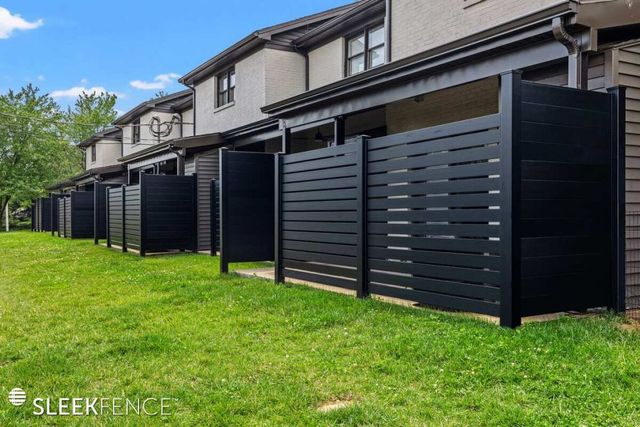All Categories
Featured

When it pertains to picking the very best secure fencing material for durability, wrought iron attracts attention as one of the most reliable and durable options readily available. Understood for its strength, visual charm, and capability to hold up against different climate problems, functioned iron is a prominent selection for both business and property homes. However just how does it compare to other secure fencing materials in terms of durability and efficiency? Let's take a more detailed take a look at wrought iron fence and how it compares to choices like vinyl, timber, and aluminum.
Stamina and Longevity of Wrought Iron Fence. Unlike many various other fence alternatives, functioned iron can sustain harsh ecological problems, consisting of extreme warm, hefty rainfall, and also strong winds. Due to the fact that it is a steel, functioned iron is not prone to the wear and tear that timber fencings usually experience, such as decomposing, bending, or insect problems.
Longevity: Wrought iron fences are incredibly tough and can stand up to effects and various other forms of physical anxiety that could harm other products. When appropriately preserved, they can last for half a century or more, making them an investment that will give long-lasting value.
Wrought Iron vs. Timber Secure fencing. Wooden fencings, while conventional and aesthetically pleasing, usually call for even more upkeep and have a shorter lifespan compared to wrought iron. Timber is susceptible to rot, termites, and weathering in time, all of which can compromise its structural integrity. In enhancement, wood fences may need to be changed or repaired every 10 to 20 years, relying on the environment and the type of wood utilized.
Maintenance: While timber fences need to be on a regular basis treated with spots, sealants, or paints to keep their look and longevity, wrought iron fences normally call for much less upkeep. They might need periodic cleansing or painting to avoid corrosion, especially in humid or coastal areas, however they won't deal with the same sorts of degradation as timber.
Long life: While a properly maintained wooden fencing could last 20 to three decades, wrought iron can surpass that life expectancy by several decades, making it a more long lasting selection in the future.
Wrought Iron vs. Vinyl Fence. Vinyl fencing has become a prominent option to timber as a result of its low maintenance and resistance to the elements. Unlike wood, vinyl doesn't rot or warp, and it doesn't need to be painted or treated. Vinyl can become weak over time, especially in regions with severe winters or severe UV direct exposure. It may split or break under pressure, such as from a heavy effect or an extreme tornado.
Toughness: While vinyl is resistant and relatively resilient to rot and fading, it still can't match the lasting toughness and toughness of functioned iron. A plastic fencing could last around 20 to thirty years, depending upon environmental factors, however it lacks the architectural integrity that wrought iron supplies.
Maintenance: Vinyl calls for minimal upkeep contrasted to timber, yet it can still fade with time, especially in locations with extreme sun exposure. Wrought iron may need periodic rust avoidance treatments however generally requires fewer treatments than vinyl.
Wrought Iron vs. Aluminum Fence. Aluminum is one more metal alternative to functioned iron, and while it shares a few of the longevity qualities of wrought iron, it is typically less strong and durable. Aluminum is much more resistant and lightweight to rust and corrosion, making it a prominent option for low-maintenance secure fencing. However, it's not as strong as wrought iron and might be more susceptible to nicking or bending under stress.

Sturdiness: Wrought iron is dramatically more powerful and much more long lasting than aluminum. While aluminum fences can last for several years, they may not stand up too in high-traffic or high-impact locations. In contrast, functioned iron is a lot more immune to physical damage and can much better endure pressure and force.
Maintenance: Both functioned iron and aluminum fences require some upkeep, primarily to prevent rust. However, aluminum is less likely to corrosion than functioned iron, making it a more low-maintenance choice in locations with high moisture or seaside salt exposure.
Last Thoughts: Wrought Iron's Toughness Advantage. Wrought iron attracts attention as one of the most resilient fence materials readily available, exceeding wood, vinyl, and light weight aluminum in regards to toughness, long life, and general efficiency. While it does need periodic upkeep, especially to stop rust, its ability to withstand severe weather, physical stress, and the test of time makes it an excellent financial investment for property owners and businesses searching for a long-lasting, safe and secure fence remedy.
For those that focus on toughness and longevity above all else, wrought iron is an unsurpassable option. Whether you're securing a home, enhancing the appearance of your backyard, or offering security for an industrial website, functioned iron fence will certainly supply decades of durability and visual appeal that couple of other materials can match.
Latest Posts
The Classic Appeal of Montana Fence's Timber Fence
Published May 09, 25
1 min read
Reliable Expenses Door Solutions for Homes and Services
Published May 09, 25
1 min read
Layout Your Perfect Bathroom
Published May 09, 25
1 min read